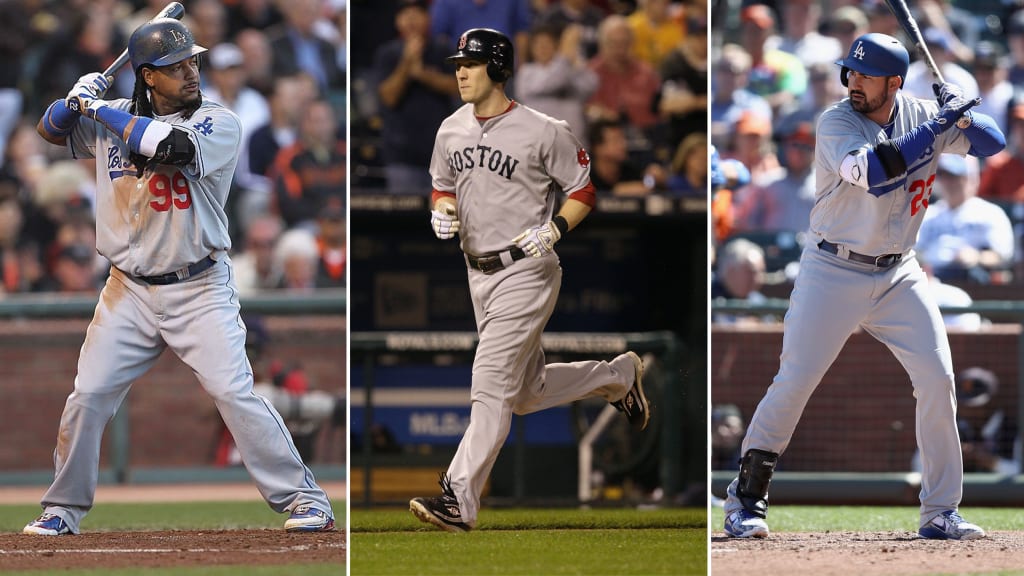
The Dodgers and Red Sox finally pulled off their blockbuster trade sending Mookie Betts and David Price, two superstars on Boston’s 2018 World Series-winning club, to Los Angeles on Monday night. Once believed to be dead, the stunner of a deal was revived over the weekend.
As shocking as this trade is, it’s far from the first jaw-dropping deal these two iconic franchises have brokered together. In fact, it is the 19th transaction between the Dodgers and Red Sox, dating to the inaugural deal between the two sides in 1923, when the Dodgers played in Brooklyn and were known as the Robins.
Although that first move wasn’t exactly memorable -- the Robins purchased infielder Johnny Mitchell from the Red Sox -- one of the next swaps, in 1939, wound up providing Brooklyn with a key figure who helped shape the sport’s future: Hall of Fame shortstop Pee Wee Reese.
Acquired for a package of unremarkable players and cash, Reese would break into the bigs the very next year, then go on to spend all 16 seasons (surrounding a military service hiatus from 1943-45) with the Dodgers -- including 1958, his last campaign but also the team’s first in LA. Among Reese’s accomplishments: 10 All-Star Games, seven World Series appearances and a title in ’55. More important, he’s perhaps best known for embracing Jackie Robinson as Major League Baseball’s first black player.
While there weren’t any more historic trades between Boston and LA over the next several decades, that has changed quite a bit since the start of this century, including multiple three-team swaps. That in mind, here are the most noteworthy deals struck between the Dodgers and Red Sox since 2000.
February 2020 -- Mookie heads to Hollywood
Dodgers get: OF Mookie Betts, LHP David Price, cash
Red Sox get: OF Alex Verdugo, SS Jeter Downs, C Connor Wong
Betts is on a wild road out west. The trade to send the 2018 AL MVP from Boston to L.A. started as a three-team deal with the Twins, then fell apart, then got put back together days later ... but as two separate deals, one between the Dodgers and Red Sox, and one between the Dodgers and Twins. Finally, after all the twists and turns, the NL West champs got their man -- as well as Price, a five-time All-Star himself, who's pitching on a seven-year, $217 million megadeal that lasts through 2022 (although the Sox will reportedly cover about half of what he's still owed).
The bottom line is that a perennial World Series contender is about to become even more of a powerhouse. Put simply, this blockbuster includes both an in-his-prime former MVP and a still-effective former Cy Young Award winner … in the same deal … to the same team.
The cost to the Dodgers of those win-now aspirations -- and the Red Sox's gain: a potential star in the making in Verdugo, a top middle-infield prospect in Downs and a solid catching prospect in Wong. The 23-year-old Verdugo was one of the top rookies in the NL before injury shortened his 2019 season, the 21-year-old Downs is MLB's No. 44 overall prospect and No. 8 shortstop prospect entering 2020, and the 23-year-old Wong was Los Angeles' No. 28 prospect last year and hit .349 with a .604 slugging percentage in 40 games at Double-A.
Aug. 25, 2012 -- Quarter-billion-dollar, nine-player waiver-trade bonanza
Dodgers get: 1B Adrian Gonzalez, OF Carl Crawford, RHP Josh Beckett, INF Nick Punto, cash
Red Sox get: 1B James Loney, RHPs Allen Webster, RHP Rubby De La Rosa, OF Jerry Sands, INF Ivan De Jesus
This was a doozy for three reasons. One, it was completed after the July 31 Trade Deadline, meaning waiver-trade rules were in effect at the time. Two, Gonzalez, Crawford and Beckett were big names who had signed long-term contracts with Boston within the previous two and a half years. And three, the enormous amount of money -- primarily in the form of those players’ contracts -- added a level of complexity to the negotiations.
Fresh off purchasing the team in March 2012 and looking to make a splash and return to contention, the new Dodgers ownership group (Guggenheim Partners) took on more than a quarter billion dollars with the salaries of Gonzalez (owed $127 million at the time), Crawford ($102.5 million) and Beckett ($31.5 million). The Dodgers fell short of the postseason for a third straight time that year but made it to October every year from ’13 through ’19. So while Gonzalez was the only piece to provide real long-term production in LA, it’s hard to criticize the decision.
The Red Sox, meanwhile, were mired in the middle of what would be a last-place finish in the AL East in ’12. But the front office then used the newfound financial freedom that offseason to re-sign David Ortiz and ink free agents Mike Napoli, Shane Victorino, Stephen Drew, Ryan Dempster, David Ross, Jonny Gomes and Koji Uehara, all of whom would contribute to the 2013 championship squad -- even if none of the pieces Boston got in the trade amounted to much.
July 31, 2011 -- Bedard to Boston highlights three-teamer
Dodgers get: C Tim Federowicz, RHP Stephen Fife, RHP Juan Rodriguez (from Red Sox)
Red Sox get: LHP Erik Bedard, RHP Josh Fields (from Mariners)
Mariners get: OF Trayvon Robinson (from Dodgers), INF Chih-Hsien Chiang (from Red Sox)
Alas, not every trade involving three teams and a large number of players winds up having big results or a lasting impact. Like, say, this one.
The impetus behind the swap was the Red Sox’s need to add an arm to a rotation dealing with injuries to Clay Buchholz and Daisuke Matsuzaka. Bedard made eight starts for Boston, winning just once, while posting a 4.03 ERA and striking out 38 batters over 38 innings.
It wasn’t enough, though, as the Red Sox fell from first place in the division to third by season’s end, and Bedard left via free agency in the ensuing offseason. As for the other six players in the deal, none wound up having a distinguished big league career.
July 31, 2008 -- Three-club blockbuster ushers in ‘Mannywood’
Dodgers get: OF Manny Ramirez (from Red Sox)
Red Sox get: OF Jason Bay (from Pirates)
Pirates get: INF Andy LaRoche, RHP Bryan Morris (from Dodgers), 1B/OF Brandon Moss, RHP Craig Hansen (from Red Sox)
This was about as big as a trade can get. Both the Dodgers and Red Sox were contenders going for it. Both Ramirez and Bay were superstar-caliber slugging outfielders, and LaRoche -- the younger brother of big leaguer Adam -- was a highly coveted, MLB-ready top prospect.
The Dodgers were 54-54 on Trade Deadline day but only two games behind the D-backs for the NL West lead when they acquired Ramirez, who had finally fallen out of favor with the Red Sox front office after his antics and behavior caused more than a few headaches in his latter years with Boston. Perhaps motivated by being jettisoned, Ramirez turned it on down the stretch, propelling the Dodgers to the division crown by hitting .396/.489/.743 with 17 homers and as many RBIs (53) as games played for LA -- and thus “Mannywood” was born.
The Dodgers, however, would go on to lose the NLCS to the World Series-champion Phillies, and although Ramirez eventually re-signed on a two-year deal in March 2009 after protracted negotiations, he would be suspended for 50 games only two months later for testing positive under MLB’s performance-enhancing drug policy.
Meanwhile, in Boston, Bay ably replaced Ramirez in the lineup in late ’08, slashing .293/.370/.527 and helping the Red Sox to a Wild Card berth before they lost to the Rays in the ALCS. He then followed that up with his last great year (.921 OPS, 36 HR, 119 RBIs) before signing a four-year contract with the Mets, where he struggled with injuries and performance.
The Pirates ended up getting very little production from LaRoche -- who registered a .637 OPS in parts of three seasons in Pittsburgh -- or any of the other three pieces acquired from the Dodgers and Red Sox.
July 31, 2004 -- Red Sox pull off a curse-breaking steal
Dodgers get: OF Henri Stanley
Red Sox get: OF Dave Roberts
Nobody could have known that the under-the-radar acquisition of Roberts on Trade Deadline day in 2004 would turn out to be a season-saving, Curse-of-the-Bambino-breaking steal of a deal -- literally -- for the Red Sox.
A speedy starting outfielder who successfully swiped 33 of 34 bases with the Dodgers that year, Roberts turned into little more than a late-inning defensive replacement and pinch-runner over the second half of the season in Boston. The Red Sox finished with the second-best AL record (98-64) but had to settle for the Wild Card because the Yankees (101-61) won the division.
After sweeping the Angels in the ALDS, Boston faced a seemingly insurmountable three-games-to-none deficit to the rival Yanks in the ALCS. That’s where Roberts’ baserunning prowess changed the course of history.
After Kevin Millar walked against Mariano Rivera to open the bottom of the ninth with Boston down a run, Roberts entered to pinch-run. With the Red Sox three outs from elimination, Roberts moved into scoring position by stealing second base just ahead of the tag and came around with the tying run on Bill Mueller’s single. That set the stage for David Ortiz’s walk-off solo shot in the 12th, a historic ALCS comeback -- and the end of an 86-year curse.
